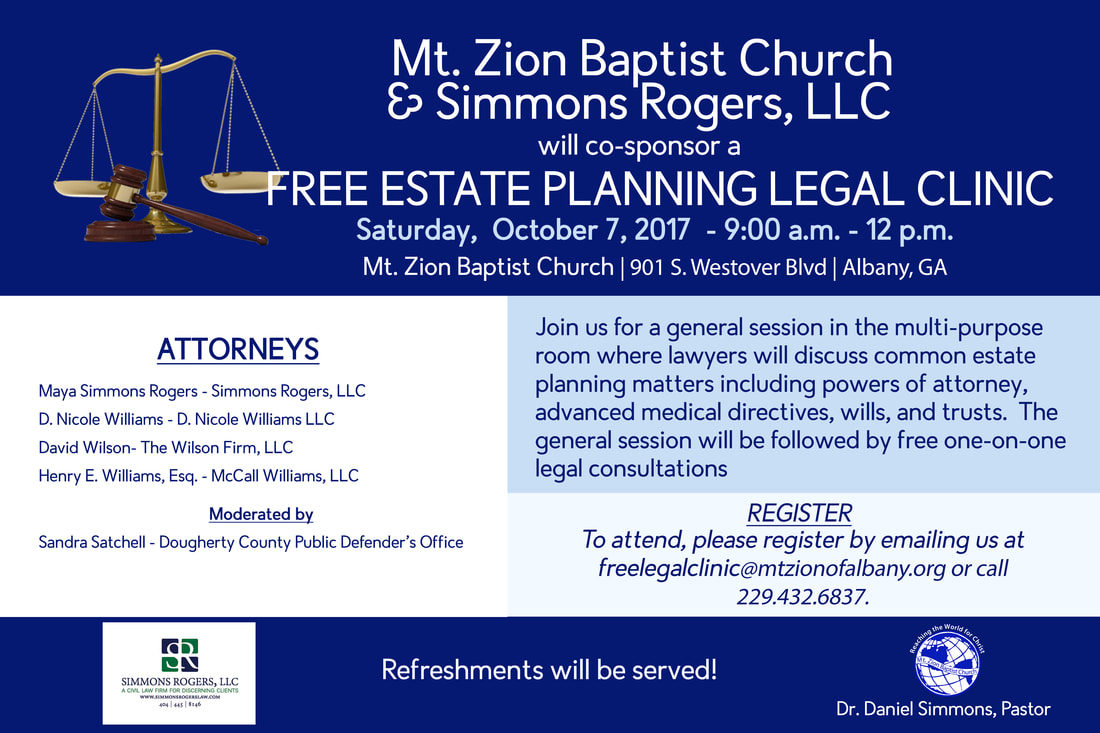Simmons Rogers, LLC will Co-Sponsor a Free Estate Planning Legal Clinic with Mt. Zion of Albany9/15/2017 On Saturday, October 7, 2017, the law firm of Simmons Rogers, LLC will co-sponsor the third free legal clinic at the historic Mount Zion Baptist Church of Albany, Georgia from 9 am - 12 pm. The October clinic will focus on estate planning and cover the most common estate planning topics including wills, trusts, medical directives, and powers of attorney. Sandra Satchell, a member of Mount Zion and an attorney at the Dougherty County Public Defender's Office will moderate the panel of volunteer lawyers. The panelist include D. Nicole Williams, a local attorney and member of Mount Zion, Henry E. Williams, a local attorney and former Terrell County probate judge, David Wilson, an attorney who was raised in Albany, and at Mount Zion, and now practices law in Atlanta, Georgia, and attorney Maya Simmons Rogers, who was also raised in Albany and at Mount Zion. Following the panel session, the panelist and other lawyers will provide free one-on-one estate planning consultations. This event is free and open to the public. Refreshments will be served. To register please email your name and number of guests, if applicable, to [email protected] or call 229-432-6837. What do the following music legends: Amy Winehouse, Bob Marley, Jimi Hendrix, Kurt Cobain, and Sonny Bono have in common with Prince? They all died without a will. Whether legend or unknown; rich or poor; young or old; we are all human at the end of the day. As humans, we all have a tendency to put uncomfortable things on the back burner. Talking about death and dying is uncomfortable, so although we know that we need to have a plan in place we put it off. However, avoidance is not the answer. The decision to avoid unpleasant things often ruins families. Bob Marley has been dead for over 30 years and his family is still fighting over his estate. Jimi Hindrix's family also fought over his estate for 30+ years. While you may not have millions, music, or a famous name to fight over, families are often torn apart over the family home, money, cars, jewelry, and other material things. Even if there is no fight, your decision not to have a will can have unintended consequences such as a family member you dislike or a family member you never knew existed inheriting your stuff. Even if what you own does not seem like much to you a will and proper estate planning can help ensure that your family isn't divided over what they think you wanted to happen to your stuff or what they want to do with your stuff. Plus your stuff will go to those whom you desire to have it. Proper estate planning will also address your needs before death if you are incapable of making decisions for yourself. As Wendy Williams said: "wills are not just for rich people, they're for people, people, people!" Check out the clip of Wendy Williams discussing the importance of estate planning below. Please be aware that every state has different laws regarding wills and the probate process so be sure that you consult a licensed attorney in your state for specific advice. If you live in Georgia, the law firm of Simmons Rogers, LLC is here to assist you with all of your estate planning needs.
 We don't always like to acknowledge or discuss our mortality but the fact remains that life the way we know it could change at any moment. That is why estate planning is so important. Estate planning is more than just having a will or setting up a trust. It also helps you plan for situations when you are still alive but can't communicate or make decisions, such as if you are in a state of unconsciousness. The question becomes who will speak for you and make decisions on your behalf? Under the Georgia Advance Directive for Health Care Act, you have the right to make choices about your health care in advance through a legal document known as an advance directive for health care. An advanced directive allows you to speak when you are unable or unwilling to do so by allowing you to list your wishes about medical care and treatment and/or allowing you to choose a person to make medical decisions for you. An advanced directive for health care also allows you nominate a person to serve as your guardian in case a court decides that a guardian should be appointed. A court will appoint a guardian for you if the court finds that you are not able to make significant responsible decisions for yourself regarding your personal support, safety or welfare. You may nominate your health care agent to be your guardian, but you have are free to nominate someone else. You should be aware that the advanced directive for health care does not give your health care agent or guardian the power to manage your property or financial affairs. You may feel like the content of the advanced directive for health care sounds familiar but you thought there was a different title. That's because people used to have living wills to provide instructions on treatment preferences for a terminal condition and state of permanent unconsciousness and a durable power of attorney for health care to appoint a health care agent. However, in 2007, the advanced directive for health care replaced both the durable power of attorney for health care and living wills in Georgia. If you have a durable power of attorney for health care or a living will that was executed before 2007, they remain effective. However, it would be a good idea for you to replace them with an advanced directive. It is important for pregnant women or women who may become pregnant to understand that the directives they select in their advance directive may not be carried out. If the baby is developed enough that the baby could survive post delivery, any directives that would result in withholding or withdrawing life sustaining treatments will not be honored. Even if the baby is not developed enough to survive delivery, a pregnant woman's directives will not be honored unless she has specifically noted that she does not want life sustaining treatment if she is pregnant with a non-viable infant. Once you have completed your advanced directive you should give a copy to your health care provider, especially if you are going in for any procedure or surgery, including giving birth. You should also give a copy to the person you designate as your health care agent and your family. It is also a good idea to keep something in your wallet that would inform medical providers that you have an advanced directive and who to contact in case of emergency. Like all estate planning, your advanced directive will only be honored if it complies with Georgia law. Your advanced directive for health care can be revoked or amended at any time and may be revoked as a matter of law upon marriage or divorce. While the decision to have an advanced directive is completely voluntary, if you have a properly executed advanced directive for health care, you can ease the burden on your love ones during an already difficult period. Your advanced directive for health care can eliminate confusion about your wishes and diffuse any disagreement among family members over health care decisions. Contact the Atlanta based law firm of Simmons Rogers, LLC for help with your advanced directive and all of your other estate planning needs. We work with clients all across the state of Georgia and we would love to work for you.  You might be wondering what is heir property!?! Heir Property is defined as land held in common by descendants of a person who dies without a valid will or whose estate was not offered for probate (meaning it was not taken to probate court for administration). Heir property can also be created when a will leaves property to more than one beneficiary. When a person dies without a valid will, the person dies intestate. All of the property owned by that person is considered intestate property. Intestate property typically passes down automatically to the qualifying heirs as tenants in common. (There are situations when the intestate property does not pass to all of the qualifying heirs but we won't cover them in this blog post.) Likewise, if a will leaves property to multiple beneficiaries, the beneficiaries own the land as tenants in common. As tenants in common, each heir owns a fractional interest in each piece of intestate property which gives each heir equal rights to use and possess the property. While this may not seem like a big deal, when it comes to real property (i.e. land and all of the structures on said land) it is. When there are multiple heirs, owners, the heir property title is considered clouded. As a result, in order to do anything with the land all of the heirs must agree. However, unanimous agreement among heir property owners is rare. In Georgia, especially rural areas, heir property is a common problem. The 5 biggest disadvantages of owning heir property are:
So what can you do to protect your family's heir property?
If there is no heir property in your family, give your ancestors a standing ovation! Then do your part to ensure that heir property never becomes an issue in your family by hiring an attorney to draft a valid will for you as a part of a comprehensive estate plan.  Although almost everyone has been in at least one motor vehicle accident, most of us still wonder what to do after an accident. Often times when motor vehicle accident victims seek compensation for their injuries they learn they do not have all of the information they need. Whether you are involved in a car accident, truck accident, motorcycle accident, or any combination thereof here is a checklist of the top 10 things you should do after an accident to protect yourself and your rights. Bookmark this page so the next time you or a loved one is an accident, you will know exactly what to do. 1. Ensure the Safety of Yourself and Others When possible get yourself and others out of the way of moving traffic. In Georgia, the law also requires you to move the vehicles out of the roadway, if there are no apparent serious personal injuries or death, the vehicle is capable of being normally and safely driven without further damage or hazard to the vehicle, traffic elements, or to the roadway. If there are apparent serious personal injuries or death do not move the vehicles until the police arrive and finish their investigation. 2. Get A Police Report Call the police immediately and report the accident. No matter what offer the other party makes always report the accident and wait for the police to arrive so that a police report can be made. If you make a deal with the other driver and do not get a police report you may cause even greater harm to yourself - especially if they do not keep there end of the deal. 3. Watch Your Mouth Be mindful of what you say and don't make any admissions. Any admissions made at the scene of an accident can be used against you. By no means are we advising you to lie to the police. Answer the questions asked by the police honestly, but limit your conversations with the other driver, passengers, and witnesses. 4. Exchange Information Exchange insurance information with the other driver and make sure you get their name, driver's license number, address, and phone number as sometimes the insured is not the driver. You should also get the other vehicle's tag number. 5. Get Contact Information From Witnesses If you notice anyone who may have witnessed the accident obtain their name, address, and telephone number as soon as possible. Many times witnesses leave once the police arrive and the safety of the accident victims are secured. 6. Take Pictures and Make a Video If you have access to a camera or a camera phone, take pictures of the accident and/or make a video. Make sure you record the condition of both vehicles, the conditions of the accident scene, and the condition of the people involved in the accident. (If family or friends arrive at the scene this is a great task for them.) 7. Seek Medical Attention Health is wealth, so don't gamble on your health. If an ambulance arrives on the scene let them check you out. Once you have been evaluated you can determine what additional emergency medical treatment is needed. If you don't need emergency medical care, you should still seek medical treatment as soon as possible to ensure that you don't have any hidden injuries because after an accident, most people are shaken up and do not feel any pain right away. 8. Take Notes At your earliest convenience, begin taking notes of the circumstances of the accident. If you are able, write down information while you are still at the crash site when it is fresh in your mind. The more details the better. Things to note include but are not limited too:
If it is determined that you need further medical treatment then it is imperative that you follow the doctor's orders. Don't skip appointments, therapy sessions, etc. If you are not satisfied with the treatment you are receiving, then switch doctors as soon as you find someone you are comfortable with. 10. Contact a Personal Injury Attorney Some advertisements may lead you to believe that if you were in an accident you are automatically entitled to money. However, that is not the case. The earlier you contact a personal injury lawyer, such as Maya Simmons Rogers of Simmons Rogers, LLC, the better. An attorney will evaluate your situation and determine if you have a case. If you have a case, your attorney will begin preserving and perfecting all of the necessary evidence. Whether you have a case or not, a good personal injury attorney will also advise you on how to further protect your rights. Even if you feel the accident is your fault, you should still follow these steps because the information you provide and collect might be useful as a part of your defense.  Photo Credit: Best Man Holiday Facebook Page Photo Credit: Best Man Holiday Facebook Page Now that everyone has had time to see the movie, Best Man Holiday, and the risk of spoiling the plot for almost everyone has passed, we wanted to take the time to highlight one of the many life lessons from the movie...planning for your death makes things easier for your friends and family. In the movie, Mia (played by Monica Calhoun), invites the entire gang to her home for Christmas. While everyone initially believes it is just a wonderful chance to get together, they soon realize that the gathering has a deeper purpose. Mia is losing her battle against cancer. She wants to spend time with everyone and help them repair their damaged relationships. While the movie is undoubtably sad, the beauty of the situation is that Mia was able to spend her last days with the ones she loved. Mia's ability to deal with the realities of life, even when her husband Lance (played by Morris Chestnut) could not, allowed Mia to be able to plan for her last days and the days that followed. It appears that Mia had her funeral all planned out, including her request that Harper (played by Taye Diggs) do her eulogy. Often times movies are unrealistic, but this scenario is not. You can be like Mia. Everyone has the opportunity to plan for their demise and ease the burden on their grieving family and friends. The best way to do this is to (1) make sure you have your estate planning documents prepared by a qualified professional and (2) ensure the documents are located in a central place that at least one person is aware of. You are never too young and never to healthy to plan for death. Do not wait until it's too late. Remember, estate planning is not just for you. It helps your loved ones understand your wishes and it lets you speak when you are no longer here. If you would like to discuss your estate planning needs contact Simmons Rogers, LLC. We are here to help. Happy Thanksgiving and safe travels! |
Simmons Rogers, LLCSimmons Rogers, LLC is a full- service civil law firm based in Atlanta, Georgia. We provide legal services as well as mediation and arbitration services, to businesses and individuals throughout the state of Georgia and beyond. Archives
January 2018
Categories
All
This blog is not intended to be a complete explanation of the law. Its purpose is to inform, not to advise on any specific legal problem or legal rights. If you have specific questions regarding any topic in this blog, you are encouraged to consult the Atlanta based law firm of Simmons Rogers, LLC or an attorney licensed in your
state. |

Simmons Rogers, LLC
4045 Orchard Rd SE, Suite 210 Smyrna, Georgia 30080 Phone: 404-445-8146 Fax: 404-445-8226 E-mail: [email protected] |
LEGAL DISCLAIMER
The information on this website is for informational purposes only and is not legal advice. Use of this website does not create an attorney-client relationship between you and Simmons Rogers, LLC. You should not act upon the information within this website without seeking advice from a lawyer licensed in your own state or country. You should not send any confidential information to Simmons Rogers, LLC until and unless a formal lawyer-client relationship has been established in writing. Unless you have received such written confirmation, we will not consider any correspondence you send us as confidential. |
© 2013-2018. All Rights Reserved. Simmons Rogers, LLC
Attorney Advertising. The choice of a lawyer is an important decision and should not be based solely upon advertisements.
Privacy Policy
Attorney Advertising. The choice of a lawyer is an important decision and should not be based solely upon advertisements.
Privacy Policy


 RSS Feed
RSS Feed